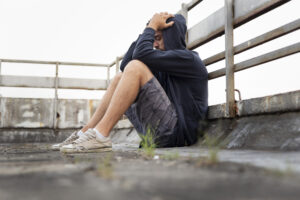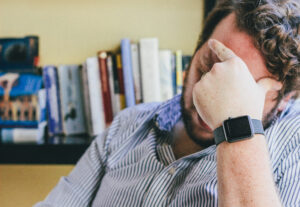Today we aim to provide you with valuable insights on coping with depression after a bicycle accident. As a bicycle accident lawyer, I have witnessed the emotional toll these incidents can take on individuals. It is not uncommon for survivors to struggle with feelings of sadness, anxiety, and even depression following such traumatic events. Understanding the emotional impact of a bicycle accident is crucial not only for those directly affected but also for their loved ones. In this post, we will explore the various ways in which depression can manifest after a bicycle accident, offer coping strategies, and shed light on the legal options available to ensure you receive the support you deserve. Join me as we delve into this important topic, seeking to provide guidance and support during your healing journey.
The Initial Impact of a Bicycle Accident and How it Contributes to Depression
Depression after a bicycle crash is a topic that cannot be overlooked, as it can have a significant impact on the life of a victim. Following such an accident, individuals may find themselves not only dealing with physical injuries, but also grappling with emotional trauma. The combination of these factors can contribute to the development of depression, making it essential to raise awareness about this issue. As a bicycle accident lawyer, I understand the challenges faced by victims in their journey towards recovery. This paragraph aims to shed light on the profound effect that a bicycle crash can have on an individual’s mental well-being and emphasize the importance of seeking proper support.
When a bicyclist experiences an accident, the physical injuries sustained are often immediately apparent. Broken bones, lacerations, or head trauma require medical attention and rehabilitation. However, beyond the obvious physical wounds, there is another component that demands attention – the emotional toll. The aftermath of a bicycle crash can be mentally distressing, leading to feelings of fear, anxiety, and sadness.
It is not uncommon for victims of bicycle accidents to face post-traumatic stress disorder (PTSD), which can significantly contribute to the development of depression. The sudden and unexpected nature of these incidents can leave individuals feeling vulnerable, shaken, and even questioning their own mortality. The life-changing impact of injuries sustained in such accidents can create a sense of helplessness and loss, leading to a downward spiral of depressive symptoms.
Experiencing depression after a bicycle crash can have a profound impact on one’s mental health. Recognizing the initial symptoms is crucial in seeking proper support and treatment. Depression can manifest in various ways, including feelings of sadness, overwhelming fatigue, difficulty sleeping, and changes in appetite and libido. Coping with such emotional and physical changes can be challenging, which is why it is important to seek help from professionals who can provide guidance and support during this difficult time. As a bicycle accident lawyer, I understand the complex nature of these cases and the toll they can take on individuals involved. It is important to remember that you are not alone in this journey and that there are resources available to help you navigate through your emotional well-being. Depression is a valid and common response to traumatic experiences like a bicycle crash, and it is crucial to prioritize self-care and reach out for assistance when needed. Remember, healing takes time, but with the right support system, you can overcome the challenges of depression and regain control of your life.
All in all, it is crucial to recognize that depression after a bicycle crash is not something to be taken lightly. If these symptoms are left untreated or unresolved, they can lead to more severe issues like feelings of hopelessness, suicidal thoughts, and difficulty functioning on a daily basis. Seeking proper medical attention and therapy is essential in managing depression and preventing it from escalating into a debilitating condition. As a bicycle accident lawyer, I understand the physical and emotional turmoil that follows a crash, and it is important to address the psychological aspect as well. By taking proactive steps to address and treat depression, individuals can regain control of their lives and enhance their overall well-being. Remember, you don’t have to face this battle alone – reach out for help and support from loved ones, professionals, and legal resources available to you. You deserve to recover fully, both physically and mentally, after such a traumatic event.
Signs and Symptoms of Post-Accident Depression
Depression after a bicycle crash is a commonly experienced emotional response to traumatic events. As a bicycle accident lawyer, I understand that the impact of such accidents extends beyond the physical injuries. Post-accident depression can manifest itself in various ways, affecting the mental and emotional well-being of individuals involved. Feelings of anxiety, guilt, and irritability may arise, making it difficult for victims to navigate through their daily lives. Moreover, the loss of interest in previously enjoyed activities, along with challenges in sleeping and concentrating, can further exacerbate the emotional burden. Changes in appetite or weight can also occur, signaling the distress caused by the accident. In some cases, individuals may even isolate themselves from social interactions as they struggle to cope with their emotions. It is crucial for those affected by depression after a bicycle crash to seek support, both from healthcare professionals and legal advocates, to ensure their well-being and potential recovery. Remember, you are not alone in this journey, and there are resources available to assist you during this difficult time.
Thus, it is crucial to recognize and address the potential for depression after a bicycle accident. Being aware of the signs and symptoms allows individuals to take control of their mental health and seek appropriate help. Depression can often worsen over time if left untreated, causing significant emotional distress and negatively impacting one’s quality of life. Therefore, it is essential for individuals who have experienced a bicycle accident to monitor their mental well-being closely. If any symptoms of post-accident depression persist regularly for at least two weeks or more, it is imperative to reach out to a professional and seek the necessary support and guidance. By seeking help promptly, individuals can receive the assistance they need to navigate through this challenging period and regain their overall well-being. Remember, your mental health is just as important as your physical recovery after a bicycle accident, so do not hesitate to reach out for support.
Coping Strategies for Managing Depression After a Bicycle Accident
Dealing with the aftermath of a bicycle accident can be overwhelming, both physically and emotionally. It is crucial to be aware that one of the common effects of such accidents is the onset of depression. The symptoms can manifest themselves in various ways, including difficulty concentrating, extreme fatigue, and noticeable changes in appetite or sleeping patterns. As a bicycle accident lawyer, I understand the importance of recognizing these signs and seeking professional help if needed. It is imperative to summon the strength to address not only the physical injuries but also the emotional toll that can arise from such traumatic experiences. By acknowledging and understanding these symptoms, individuals can take proactive steps towards their recovery and overall well-being. Remember, seeking professional help is not a sign of weakness; it is a courageous decision that can help pave the way towards healing and finding support in navigating the complexities of depression after a bicycle accident.
Experiencing depression after a bicycle crash can be a challenging and overwhelming ordeal. However, there are effective ways to manage and conquer this emotional rollercoaster. Developing healthy coping strategies is crucial in overcoming the effects of depression caused by such an accident. Engaging in physical activity is one strategy that can prove beneficial, as it helps release endorphins and elevate mood. By partaking in activities like biking or walking, individuals can not only boost their physical well-being but also improve their mental state. Another helpful approach is to open up and talk to supportive friends or family members. Sharing feelings and thoughts with trusted loved ones can provide much-needed comfort and reassurance during this difficult time. Additionally, taking out time for self-care activities, such as practicing yoga or meditation, can greatly contribute to alleviating depression symptoms. These mindfulness techniques help foster relaxation, reduce stress, and promote a sense of inner peace. As a bicycle accident lawyer, I understand the emotional toll that such incidents can have on individuals, and I encourage those struggling with depression after a bicycle crash to consider implementing these coping strategies. Remember that seeking professional help from mental health experts is also vital, as they can provide personalized guidance and support throughout the recovery process. Together, we can navigate through this challenging phase and work towards healing both physically and emotionally.
Finally, in the aftermath of a bicycle accident, it is crucial for individuals to recognize the profound impact it can have on their mental health. Depression after a bicycle crash is a common occurrence, and seeking professional assistance can be an invaluable resource for those grappling with its effects. By engaging with a therapist or counselor, individuals can gain access to tailored strategies aimed at managing their symptoms and navigating the emotional complexities of the healing process. This form of support can provide a lifeline, giving individuals the tools and reassurance needed to overcome their depression and emerge stronger. Therefore, it is highly recommended that anyone experiencing depression after a bicycle accident take advantage of the expertise and empathetic guidance that professional assistance can offer, ensuring their journey towards recovery is a smoother and more manageable one.
Seeking Professional Advice: When is it Time?
Experiencing a bicycle accident can have a profound impact on both physical and emotional well-being. While it is normal to feel overwhelmed and down at times after such an incident, it’s important to recognize when those feelings become more frequent and intense. In some cases, individuals may find themselves struggling with depression after a bicycle accident. Depression is a serious condition that can significantly affect one’s quality of life, and seeking professional help is crucial in addressing it. As a bicycle accident lawyer, I understand the challenges that individuals face after such incidents, not only in terms of physical recovery but also the emotional toll it can take. It is essential to remember that seeking professional help for depression is not a sign of weakness but rather a step towards healing and regaining control over one’s life. By reaching out to a mental health professional, you can receive the necessary support and resources tailored to your specific needs. They can guide you through the process of understanding and managing your emotions, helping you regain a sense of normalcy and hope for the future. Remember, you don’t have to face depression alone after a bicycle accident, and there are resources available to support you on your path to recovery.
If you find yourself experiencing depression after a bicycle accident, it is important to seek help from a professional therapist or doctor. These professionals not only have the expertise to identify the underlying cause of your depression but can also provide therapy and medication that can assist you in managing it in a healthy way. Depression after a bicycle accident is not uncommon, as such traumatic events can leave lasting emotional and psychological impacts. However, understanding the root cause of your depression and finding effective ways to cope with it is crucial for your overall well-being. A professional therapist or doctor can guide you through this journey, offering support and strategies tailored to your specific needs. Their expertise will be instrumental in helping you regain control over your mental health and ultimately lead a fulfilling life. Remember, you are not alone in this journey, and seeking help is a brave step towards healing and recovery.
In conclusion, it is essential to address the emotional impact of depression after a bicycle accident. Seeking support from a professional not only allows for a safe space to express your emotions but also provides guidance in developing effective coping mechanisms. By working with a therapist or counselor, you can explore the root causes of your depressive episodes and build strategies to manage and mitigate them in the future. Remember that you are not alone in this journey, and reaching out for help is a significant step towards healing. By actively engaging in therapy sessions, you will gain valuable insights, acquire tools to navigate difficult emotions, and ultimately decrease the recurrence of depressive episodes. With the support and guidance of professionals, you can find the strength to overcome the challenges associated with depression after a bicycle accident and embark on a path towards improved mental well-being.
Understanding the emotional impact of a bicycle accident is vital in order to navigate the complex terrain of recovery. By recognizing the various ways depression can manifest after such a traumatic event, we can begin to address and cope with these emotions effectively. From seeking professional help to leaning on loved ones for support, there are numerous strategies available to help you on your healing journey. Furthermore, it is important to be aware of the legal options at your disposal, ensuring that you receive the necessary support and compensation you deserve. Remember, you are not alone in this process, and together, we can overcome the emotional challenges that arise from a bicycle accident. Let us support and guide you every step of the way.
Call or text 1-844-242-9253 or complete a Free Case Evaluation form



